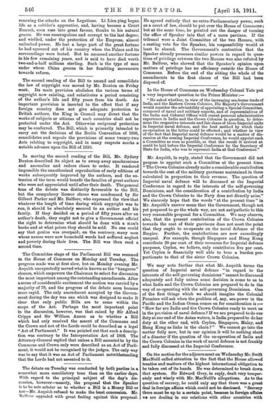In moving the second reading of the Bill, Mr. Sydney
Buxton described its object as to sweep away anachronisms and anomalies and reduce chaos to order. It rendered impossible the unauthorised reproduction of early editions of works subsequently improved by the authors, and the ex- tension of the term would benefit the families of great authors who were not appreciated until after their death. The general tone of the debate was distinctly favourable to the Bill, but the compulsory licence clause was condemned by Sir Gilbert Parker and Mr. Balfour, who expressed the view that whatever the length of time during which copyright was to run, it should be absolutely secured to an author and his family. If they decided on a period of fifty years after an author's death, they ought not to give a Government official the right to determine what should be done with a man's books and at what prices they should be sold. No one could say that genius was overpaid; on the contrary, many men whose names were now household words had suffered neglect and poverty during their lives. The Bill was then read a second time.




































 Previous page
Previous page